Intro
Discover causes and symptoms of fluid buildup in ear, including hearing loss, ear fullness, and tinnitus, and learn about middle ear effusion, Eustachian tube dysfunction, and other related conditions.
Fluid buildup in the ear, also known as otitis media with effusion, is a common condition that affects people of all ages. It occurs when fluid accumulates in the middle ear, which is the air-filled space behind the eardrum. This condition can cause a range of symptoms, from mild discomfort to severe hearing loss. In this article, we will delve into the causes, symptoms, and treatment options for fluid buildup in the ear.
The middle ear is a complex system that plays a crucial role in our ability to hear. It consists of three small bones, known as ossicles, that transmit sound vibrations from the eardrum to the inner ear. The Eustachian tube, which connects the middle ear to the back of the throat, helps to regulate air pressure and drain fluid from the ear. However, when the Eustachian tube becomes blocked or dysfunctional, fluid can accumulate in the middle ear, leading to a range of problems.
Fluid buildup in the ear can be caused by a variety of factors, including colds, allergies, sinus infections, and ear infections. When the Eustachian tube becomes blocked, it can prevent the middle ear from draining properly, leading to a buildup of fluid. This can also be caused by anatomical issues, such as a narrow or malformed Eustachian tube. In some cases, fluid buildup in the ear can be a symptom of a more serious underlying condition, such as a tumor or cyst.
Causes of Fluid Buildup in the Ear
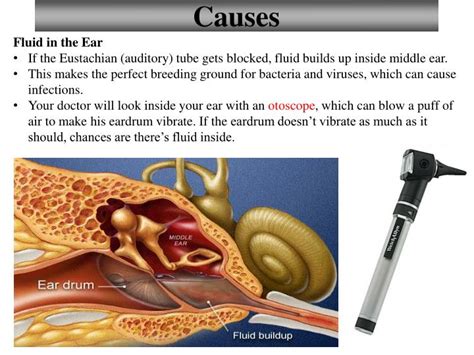
The causes of fluid buildup in the ear are varied and can be classified into several categories. These include:
- Viral infections, such as the common cold or flu
- Bacterial infections, such as sinusitis or otitis media
- Allergies, which can cause the Eustachian tube to become blocked
- Anatomical issues, such as a narrow or malformed Eustachian tube
- Trauma to the ear or head, which can cause the Eustachian tube to become blocked
In addition to these causes, there are several risk factors that can increase a person's likelihood of developing fluid buildup in the ear. These include:
- Age: Children under the age of 7 are more likely to develop fluid buildup in the ear due to the smaller size of their Eustachian tube.
- Family history: People with a family history of ear problems are more likely to develop fluid buildup in the ear.
- Exposure to smoke: Exposure to cigarette smoke can increase the risk of developing fluid buildup in the ear.
Symptoms of Fluid Buildup in the Ear
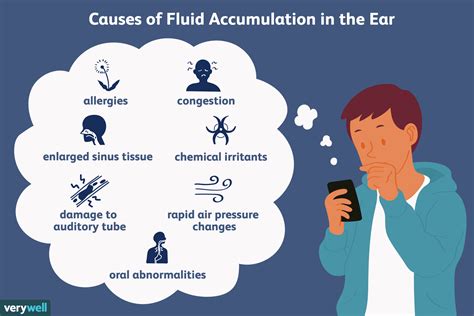
The symptoms of fluid buildup in the ear can vary depending on the severity of the condition. Some common symptoms include:
- Hearing loss: Fluid buildup in the ear can cause a range of hearing problems, from mild hearing loss to complete deafness.
- Ear fullness: The affected ear may feel full or blocked, which can be uncomfortable and even painful.
- Ear pain: Fluid buildup in the ear can cause pain or discomfort in the affected ear.
- Dizziness: In some cases, fluid buildup in the ear can cause dizziness or vertigo.
- Ringing in the ears: Fluid buildup in the ear can cause tinnitus, which is a ringing or buzzing sound in the affected ear.
In addition to these symptoms, fluid buildup in the ear can also cause a range of other problems, including:
- Delayed speech development in children
- Difficulty concentrating or paying attention
- Balance problems or vertigo
- Ear infections or other complications
Treatment Options for Fluid Buildup in the Ear
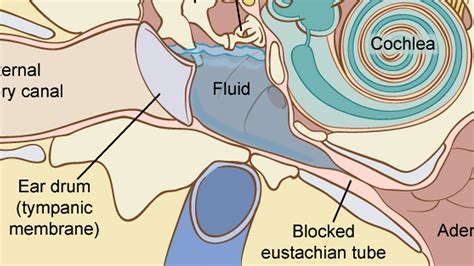
The treatment options for fluid buildup in the ear depend on the underlying cause of the condition. In some cases, the condition may resolve on its own with time and rest. However, in other cases, medical treatment may be necessary to alleviate symptoms and prevent complications.
Some common treatment options for fluid buildup in the ear include:
- Antibiotics: If the condition is caused by a bacterial infection, antibiotics may be prescribed to help clear up the infection.
- Decongestants: Decongestants can help to reduce congestion and promote drainage of the Eustachian tube.
- Nasal steroids: Nasal steroids can help to reduce inflammation and promote drainage of the Eustachian tube.
- Ear tubes: In some cases, ear tubes may be inserted to help drain fluid from the middle ear.
- Surgery: In severe cases, surgery may be necessary to repair any damage to the middle ear or to remove any blockages that are causing the condition.
Home Remedies for Fluid Buildup in the Ear

In addition to medical treatment, there are several home remedies that can help to alleviate symptoms and promote healing. These include:
- Warm compresses: Applying a warm compress to the affected ear can help to reduce pain and promote drainage.
- Elevating the head: Elevating the head while sleeping can help to reduce congestion and promote drainage of the Eustachian tube.
- Steam inhalation: Inhaling steam from a bowl of hot water or a steam humidifier can help to reduce congestion and promote drainage of the Eustachian tube.
- Nasal saline irrigation: Irrigating the nasal passages with a saline solution can help to reduce congestion and promote drainage of the Eustachian tube.
Prevention of Fluid Buildup in the Ear
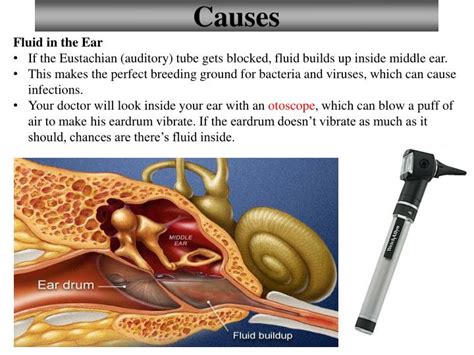
While fluid buildup in the ear can be a challenging condition to prevent, there are several steps that can be taken to reduce the risk of developing the condition. These include:
- Getting vaccinated against the flu and other viral infections
- Avoiding exposure to cigarette smoke and other pollutants
- Practicing good hygiene, such as washing hands regularly and avoiding close contact with people who are sick
- Getting regular check-ups with a healthcare provider to monitor for any signs of ear problems
Complications of Fluid Buildup in the Ear
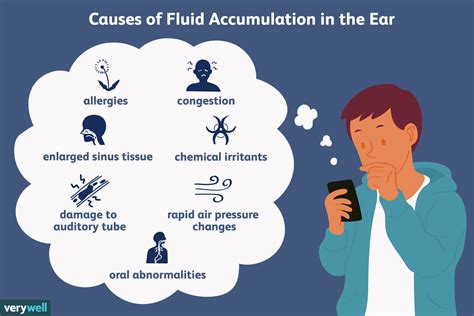
If left untreated, fluid buildup in the ear can lead to a range of complications, including:
- Hearing loss: Prolonged fluid buildup in the ear can cause permanent hearing loss.
- Ear infections: Fluid buildup in the ear can increase the risk of developing ear infections, which can be painful and difficult to treat.
- Balance problems: Fluid buildup in the ear can cause balance problems or vertigo, which can increase the risk of falls and other accidents.
- Speech and language delays: In children, fluid buildup in the ear can cause delays in speech and language development.
Diagnosis of Fluid Buildup in the Ear
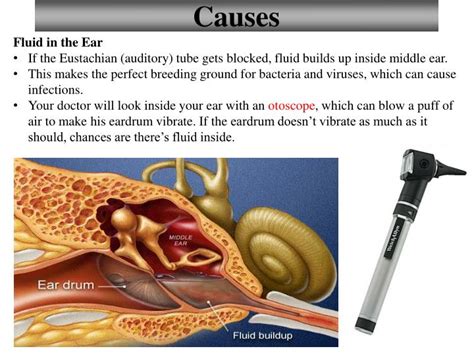
Diagnosing fluid buildup in the ear typically involves a combination of physical examination, medical history, and diagnostic tests. A healthcare provider may use an otoscope to examine the ear and look for signs of fluid buildup, such as a bulging eardrum or fluid in the middle ear.
In addition to physical examination, a healthcare provider may also use diagnostic tests, such as:
- Tympanometry: This test measures the movement of the eardrum and the reflexes of the middle ear muscles.
- Acoustic reflectometry: This test measures the amount of fluid in the middle ear.
- Hearing tests: These tests measure the ability to hear sounds and can help to diagnose any hearing loss or other problems.
Conclusion and Next Steps

Fluid buildup in the ear is a common condition that can cause a range of symptoms, from mild discomfort to severe hearing loss. While the condition can be challenging to prevent, there are several steps that can be taken to reduce the risk of developing the condition. If you are experiencing symptoms of fluid buildup in the ear, it is essential to seek medical attention to prevent complications and promote healing.
We hope this article has provided you with a comprehensive understanding of fluid buildup in the ear, including its causes, symptoms, treatment options, and prevention strategies. If you have any further questions or concerns, please do not hesitate to reach out to a healthcare provider.
What are the symptoms of fluid buildup in the ear?
+The symptoms of fluid buildup in the ear can include hearing loss, ear fullness, ear pain, dizziness, and ringing in the ears.
How is fluid buildup in the ear diagnosed?
+Diagnosing fluid buildup in the ear typically involves a combination of physical examination, medical history, and diagnostic tests, such as tympanometry, acoustic reflectometry, and hearing tests.
What are the treatment options for fluid buildup in the ear?
+The treatment options for fluid buildup in the ear depend on the underlying cause of the condition and can include antibiotics, decongestants, nasal steroids, ear tubes, and surgery.
How can I prevent fluid buildup in the ear?
+While fluid buildup in the ear can be a challenging condition to prevent, there are several steps that can be taken to reduce the risk of developing the condition, such as getting vaccinated against the flu and other viral infections, avoiding exposure to cigarette smoke and other pollutants, and practicing good hygiene.
What are the complications of fluid buildup in the ear?
+If left untreated, fluid buildup in the ear can lead to a range of complications, including hearing loss, ear infections, balance problems, and speech and language delays.
We encourage you to share this article with anyone who may be experiencing symptoms of fluid buildup in the ear. Additionally, if you have any personal experiences or tips for managing the condition, please feel free to share them in the comments section below. By working together, we can help to raise awareness and promote understanding of this common and often misunderstood condition.
